Connect Klipper
- This tutorial is for flashing KLIPPER firmware onto the Fly-Buffer-Plus buffer board
- Flashing completes means the pressure sensor firmware pins are overwritten
- To restore previous functionality, you must either write your own macros or reflash the original firmware
- Any configuration and macros used must be written by yourself
Flashing the Bootloader (BL)
Entering Flash Mode
- There are two methods to enter flash mode
- First: With the toolboard completely powered off, press and hold the BOOT button, then connect one end of a data-capable TYPE-C cable to the mainboard and the other end to your device
- Second: After connecting one end of a data-capable TYPE-C cable to the mainboard and the other end to your device, press and hold the BOOT button, then press the RST button, release the RST button and finally release the BOOT button

Flashing Firmware
- Windows Flashing Tutorial
- Host Flashing Tutorial
- Buffer board BL firmware
- Click the download link below
-
Loading...
USB3.0may fail to flash, please try to use the computer'sUSB2.0for flashing- If flashing still fails, please try using a host computer for flashing
- If the error below occurs, please use a USB hub

- Flashing tool Download link
- Please download
SetupSTM32CubeProgrammerandSTM32 DFU driver - Copy the previously compiled firmware
klipper.bin,Katapult, orMarlinto any directory on your computer - Connect the motherboard to the computer using a Type-C cable, ensuring it has entered
dfuflashing mode - In STM32CubeProgrammer, select USB mode, then refresh and connect

- If no error pop-up appears, the connection is successful.
Warning
If the content shown in the figure below appears, it indicates a computer or software issue. Please use a host computer for flashing: Host Computer Flashing Tutorial

- Click the download icon on the left and check the options below

- Click the
Browsebutton as indicated by the arrow, then select the firmware you need to flash
- Enter
0x08000000in theStart addressfield- Please note that if the firmware is in
HEXformat, skip this step!!

- Please note that if the firmware is in
- Click
Start automatic modebelow to begin flashing the firmware
- If the prompt shown below appears, the firmware flashing is complete

- Install the burning tool
- No need to install the burning tool for the FLY upper computer
- If you need to install, please note: The upper computer needs to be connected to the internet to install normally
- If already installed, no need to install
sudo apt update
sudo apt install dfu-util -y
- Execute the following command to check if the connection is successful.
lsusb
- If there is no DFU device, please try to re-enter burning mode
- Due to system version issues, other names may be displayed. If
0483:df11is shown, it indicates that the burning mode has been entered

- Pull the pre-compiled firmware
- These are all pre-compiled firmwares
- Please note: The upper computer needs to be connected to the internet to install
- The upper computer needs to execute the command below to download the firmware package (if unable to get the file due to network issues on the upper computer, please contact the administrator in the after-sales group)
cd && git clone https://github.com/FengHua741/FLY_Katapult.git
- If the firmware package has already been downloaded, it is recommended to update the firmware package before proceeding with the remaining operations
cd ~/FLY_Katapult && git pull
- Flashing Firmware
Only one firmware needs to be flashed
- Below are the firmware flashing commands
sudo dfu-util -a 0 -d 0483:df11 --dfuse-address 0x08000000 -D ~/FLY_Katapult/BL/buffer/FLY_BUFFER.bin
-
If the content
File downloaded successfullyappears at the arrow position shown in the figure below, the flashing was successful
After flashing, the mainboard needs to be completely powered off once.
USB Firmware Compilation
Start Compilation
- A host computer with the
klipperservice installed is required Connect via SSH over the network - And the device is connected to the host computer
- Note: Please use a regular host computer, such as Raspberry Pi FLY. If it is a modified host computer (such as a WiFi stick, Redmi, etc.), due to too many issues, we cannot provide technical support
- FlyOS-Armbian system and general system notes
- FlyOS-FAST system notes
- Notes on
FlyOS-Armbiansystem and general system- Ordinary host computer systems such as Raspberry Pi, FLY are viewed in this category
- Do not use the
ROOTuser for any operations on these host computers - Please use a normal user for operations
- To switch users, for
FlyOS-Armbiansystem use thesu flycommand to switch to a normal user - For other systems, use the
su <your host computer username>command to switch to a normal user
su <your host computer username>
- Notes on
FlyOS-FASTsystem- The default username for
FAST systemisroot, password ismellow - Compiling firmware can only be done using the
rootuser - And
FAST systemonly hasROOTuser, you don't need to switch users!!!
- The default username for
::: tip
- Please ensure that the host machine can connect to the network normally.
- Before compiling the firmware, use SSH to log in to the host machine via the network.
- Do not use a serial port tool to log in to the host machine.
:::
Klipper Firmware Compilation and Configuration Page Operation Instructions
::: tip
Please make sure that the keyboard input method is in half-width mode, i.e., English mode.
:::
- The key
↑(up arrow) and↓(down arrow) on the keyboard are used to move the cursor up and down to select menu items. - The confirm key
Enteror spacebarSpaceis used to check the menu or enter a sub-menu. - The exit key
ESCis used to return to the previous menu. - The
Qkey is used to exit the Klipper firmware configuration page. - When exiting the Klipper firmware configuration page and there is a prompt, press the
Ykey to save the configuration file.
::: warning
If there are fewer options in the configuration page, please first check [ ] Enable extra low-level configuration options to display some hidden options.
:::
Below is the introduction on how to compile the firmware:
-
After connecting to SSH, enter the following command and press Enter:
cd ~/klipper && rm -rf ~/klipper/.config && rm -rf ~/klipper/out && make menuconfig -
Where
rm -rf ~/klipper/.config && rm -rf ~/klipper/outis to delete previous compilation data and firmware.make menuconfigis to compile the firmware. After execution, the following interface should appear: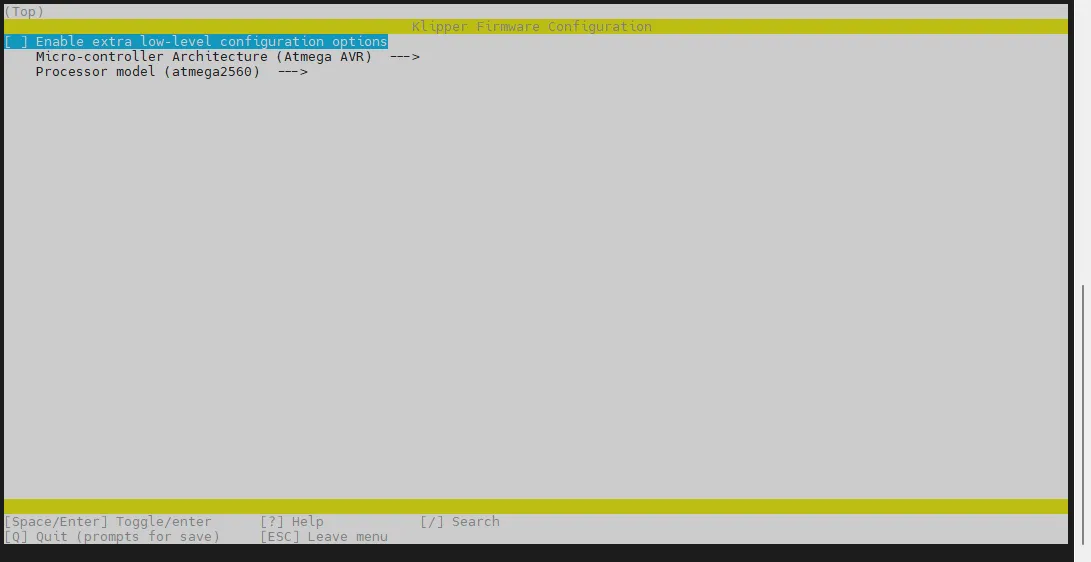
-
Select Enable extra low-level configuration options and press Enter
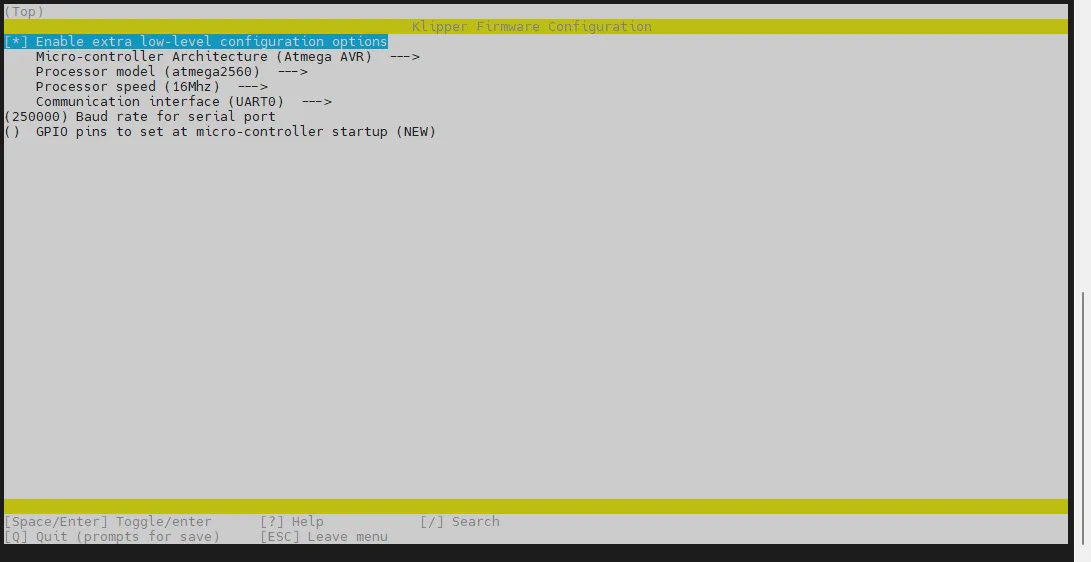
-
Enter the menu Micro-controller Architecture then select STMicroelectronics STM32 and press Enter
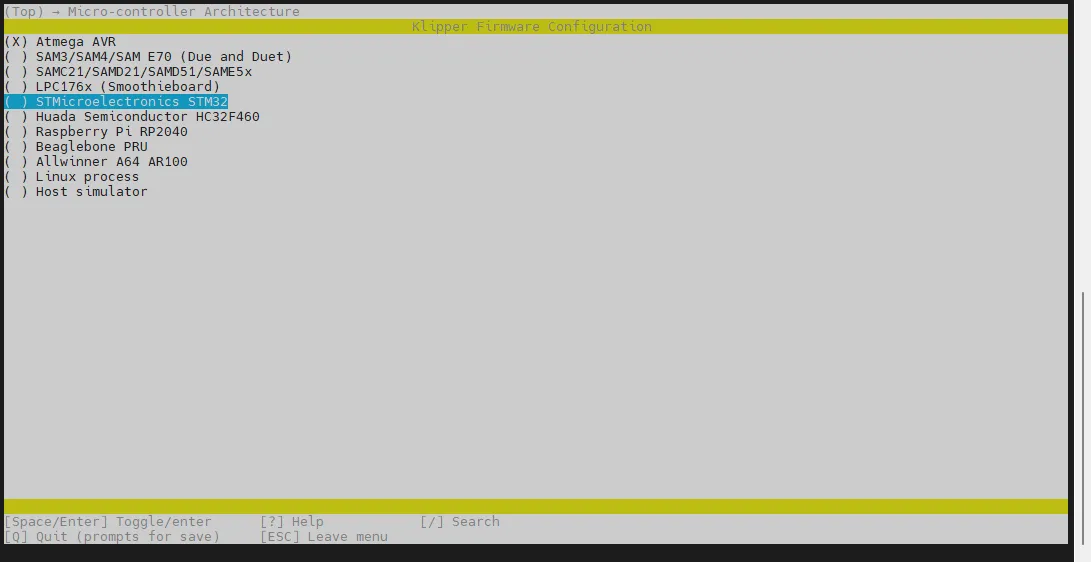
-
Enter the menu Processor model, select STM32F072 and press Enter

-
Select Bootloader offset, choose: 8KiB bootloader

-
Communication interface, select: USB (on PA11/PA12) and press Enter

-
Please verify against the following image to ensure it matches before proceeding

- Press the
Qkey, Save configuration will appear, then press theYkey - At this point the configuration should be saved and you should return to the command line interface
- Enter the command below to start compiling, this will take some time
make -j4
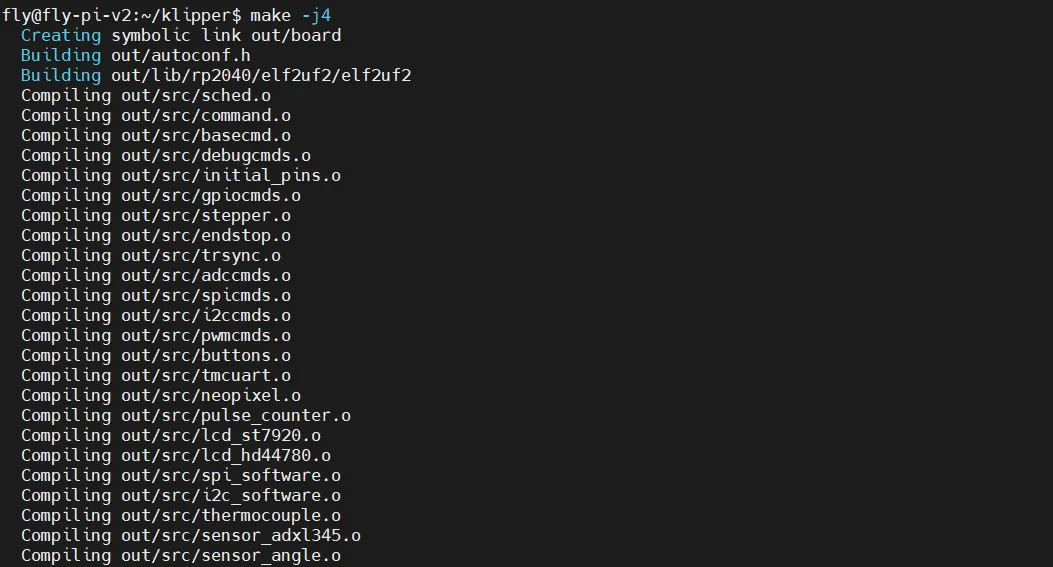
-
If the following content is output at the end, the compilation was successful
Linking out/klipper.elf
Creating hex file out/klipper.bin
- Below is a recording of the firmware compilation process
Entering Flash Mode
- Double press the
RSTbutton to enter flash mode

Confirm Entered Flash Mode
- Please ensure that the host machine can connect to the network normally and ensure that the data cable connecting the lower-level machine to the host machine has data transmission function.
- After SSH connecting to the host machine, input
lsusband press Enter. If the information circled in the following picture appears, you can proceed to the next step.- If there is no feedback at all, this is a system problem of the host machine, and we are unable to help. You need to replace with a confirmed normal system or replace the host machine.
- If the prompt says there is no
lsusbcommand, you can execute the following command to install it:sudo apt-get install usbutils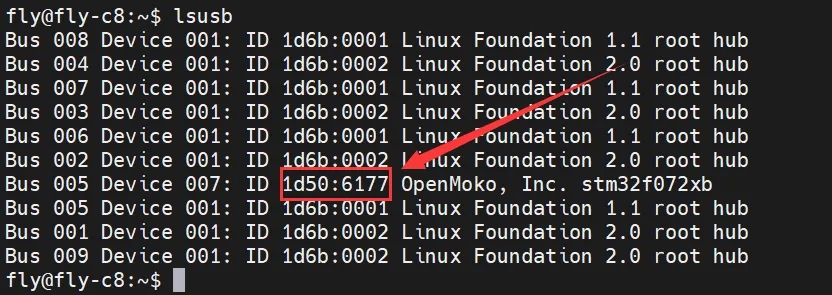
1d50:6177belongs to the device you will use this time.- Some host machines may not fully display or fail to display due to system problems.
- If the
lsusbcommand can display the device but does not show1d50:6177, please try replacing the data cable and connecting the mainboard to another USB port on the host machine.
- If you have executed the above steps before and successfully burned the Klipper firmware, and the mainboard is running normally, but you just want to update the Klipper firmware, please directly check the
Firmware Updatesection in the right menu bar of this page.
You must query the 1d50:6177 device before proceeding to the next step.
Flashing Firmware
- When installing the programming plugin, you need to be connected to the internet. Please ensure that your host computer is already properly connected to the Internet.
- If it has been installed, there is no need to install it again.
Start Programming
- For non-fly host computers, please make sure to execute the following code to install the dependency package for firmware programming! Otherwise, the firmware cannot be programmed!
cd && git clone https://github.com/Arksine/katapult.git - Use this command to install in China
cd && git clone https://gitee.com/MrCakeFuck/katapult.git

-
Use the following instruction to search for your device ID, and the ID shown in the figure below should appear (note: the ID shown in the figure is for reference only, and each motherboard has a different ID):
ls /dev/serial/by-id/*
-
To program the firmware, use the following code, and make sure the firmware has been compiled successfully. Please replace
<your motherboard ID>with the ID queried in the previous step.~/klippy-env/bin/python ~/katapult/scripts/flashtool.py -d /dev/serial/by-id/<your motherboard ID>
For the fast system, use this command to program, please replace <your motherboard ID> with the ID queried in the previous step.
python ~/katapult/scripts/flashtool.py -d /dev/serial/by-id/<your motherboard ID>
-
Below is a reference:
-
After programming is complete, refer to the following:

Firmware Update
- USB Firmware Update
- Bridge CAN Firmware Update
-
Use the following instruction to search for your motherboard ID, and the ID shown in the figure below should appear (note: the ID shown in the figure is for reference only, and each motherboard has a different ID).
ls /dev/serial/by-id/*
In the figure below, /dev/serial/by-id/usb-katapult_rp2040_E662549553642032-if00 is the motherboard's ID.

-
To update the USB firmware, after compiling the latest firmware, enter the following command to update, please replace
<your motherboard ID>with the ID queried in the previous step.cd ~/klipper/ && make flash FLASH_DEVICE=<your motherboard ID>
- To update the USB bridge CAN firmware, you need to enter the Katapult after compiling the latest firmware. Enter the following command (the ID in the figure below is for reference only, please use the ID in your configuration file).
<your CANBUS UUID>is the CANBUS UUID of the motherboard in your printer.cfg configuration file.
~/klippy-env/bin/python3 ~/katapult/scripts/flashtool.py -i can0 -r -u <your CANBUS UUID>
For the fast system, use this command to burn, please replace <your motherboard ID> with the ID queried in the previous step.
python3 ~/katapult/scripts/flashtool.py -i can0 -r -u <your CANBUS UUID>
- In the figure below,
f95cee90e1f9is the motherboard's CANBUS UUID.

-
After resetting into Katapult, use the following command to search for your motherboard ID, and the ID shown in the figure below should appear (note: the ID shown in the figure is for reference only, and each motherboard has a different ID).
ls /dev/serial/by-id/*
In the figure below, /dev/serial/by-id/usb-Klipper_stm32f072xb_43002C000951324757373520-if00 is the motherboard's ID.

-
Make sure to execute the programming after the new firmware is compiled successfully. Please replace
<your motherboard ID>with the ID queried in the previous step.cd ~/klipper/ && make flash FLASH_DEVICE=<your motherboard ID>
Solution for Incorrect Firmware Burning
- Power off the motherboard, power on again, and quickly double-click the reset button to re-enter programming mode.
- Or use the window/host machine to re-burn the katapult firmware burn katapult firmware
Search for USB ID
- Open the browser and enter the IP address of the host computer in the address bar. For example, if my host computer's IP is
192.168.101.179, directly type it in and press Enter.
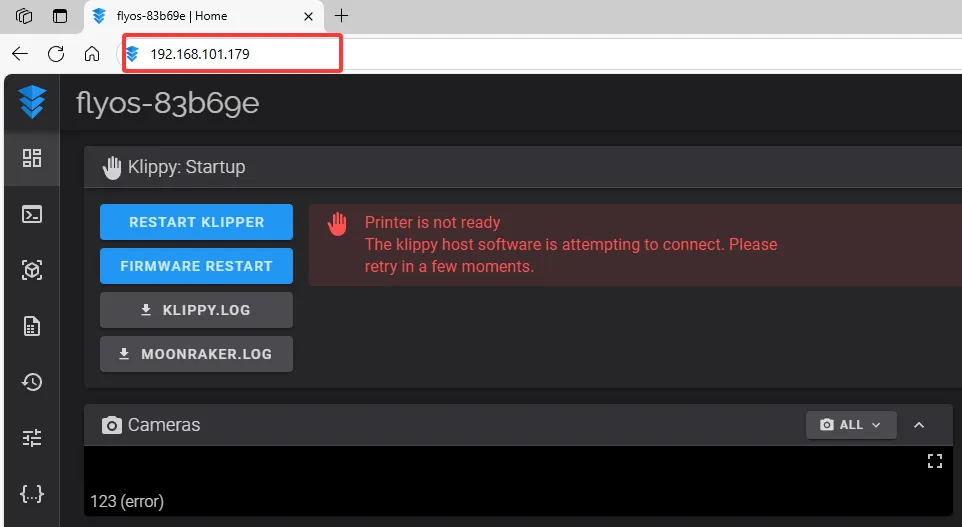
- Open the host computer's web interface and locate the following configuration options in the left sidebar:
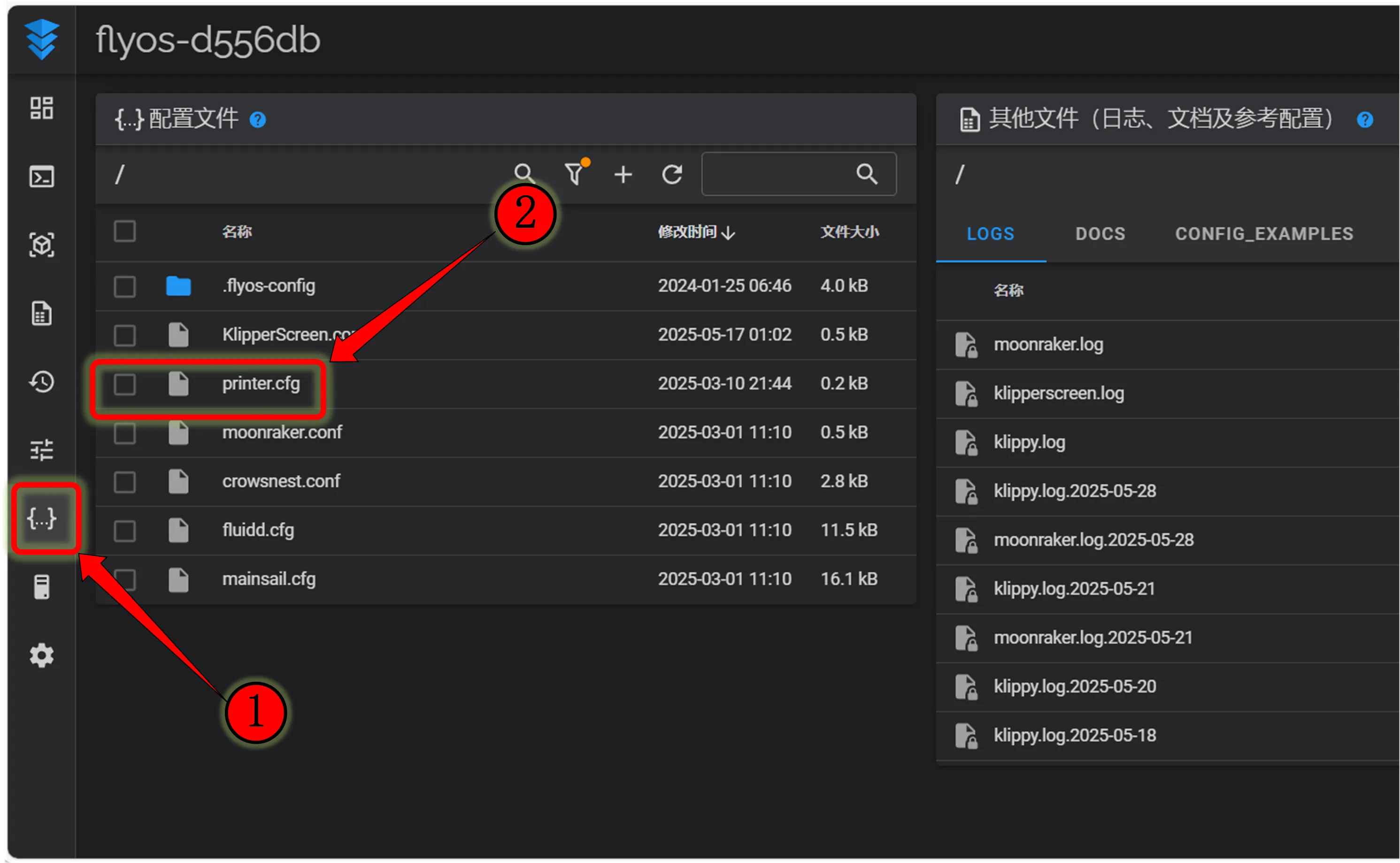 |
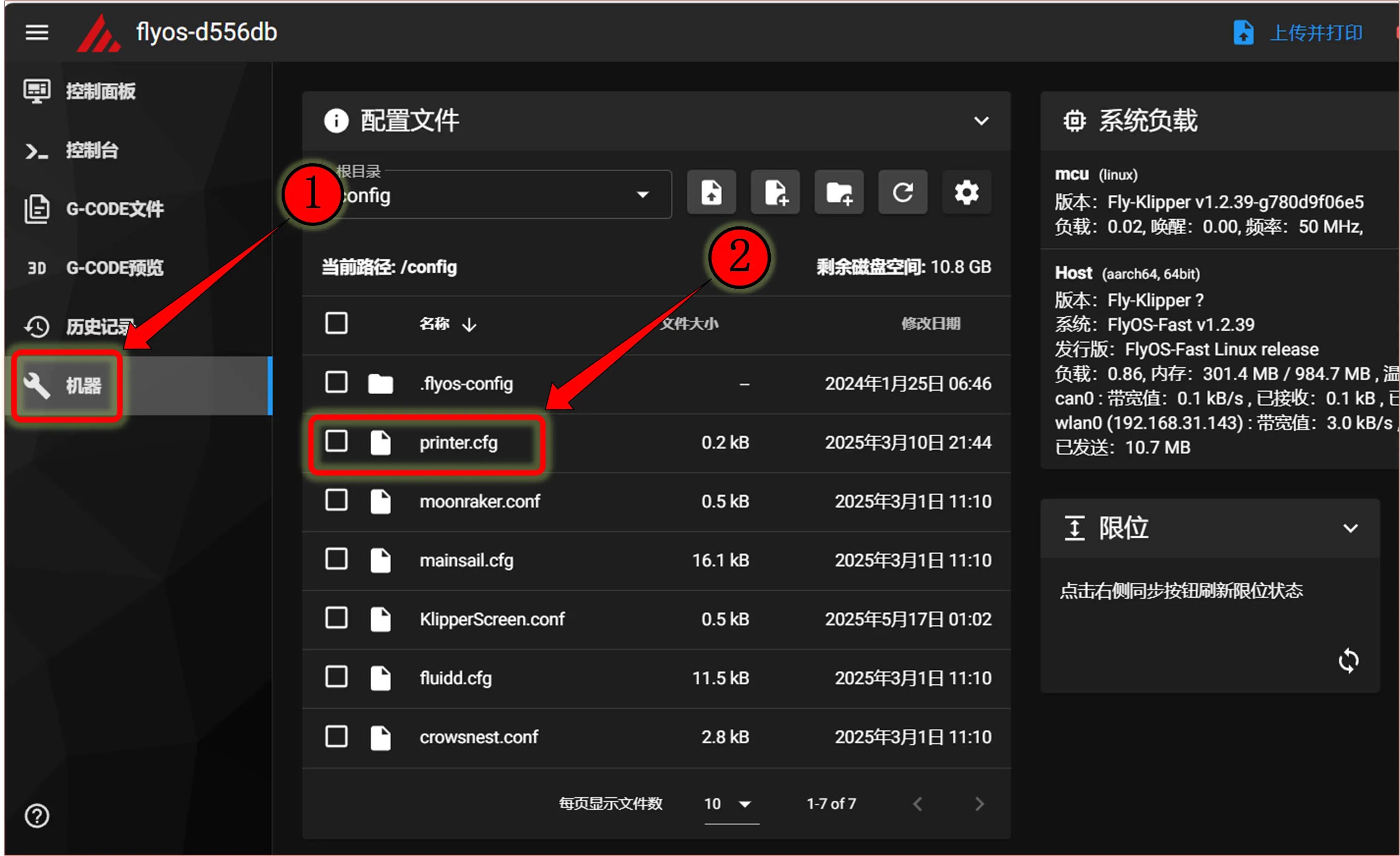 |
-
After clicking into
printer.cfg, click onDEVICESin the top right corner.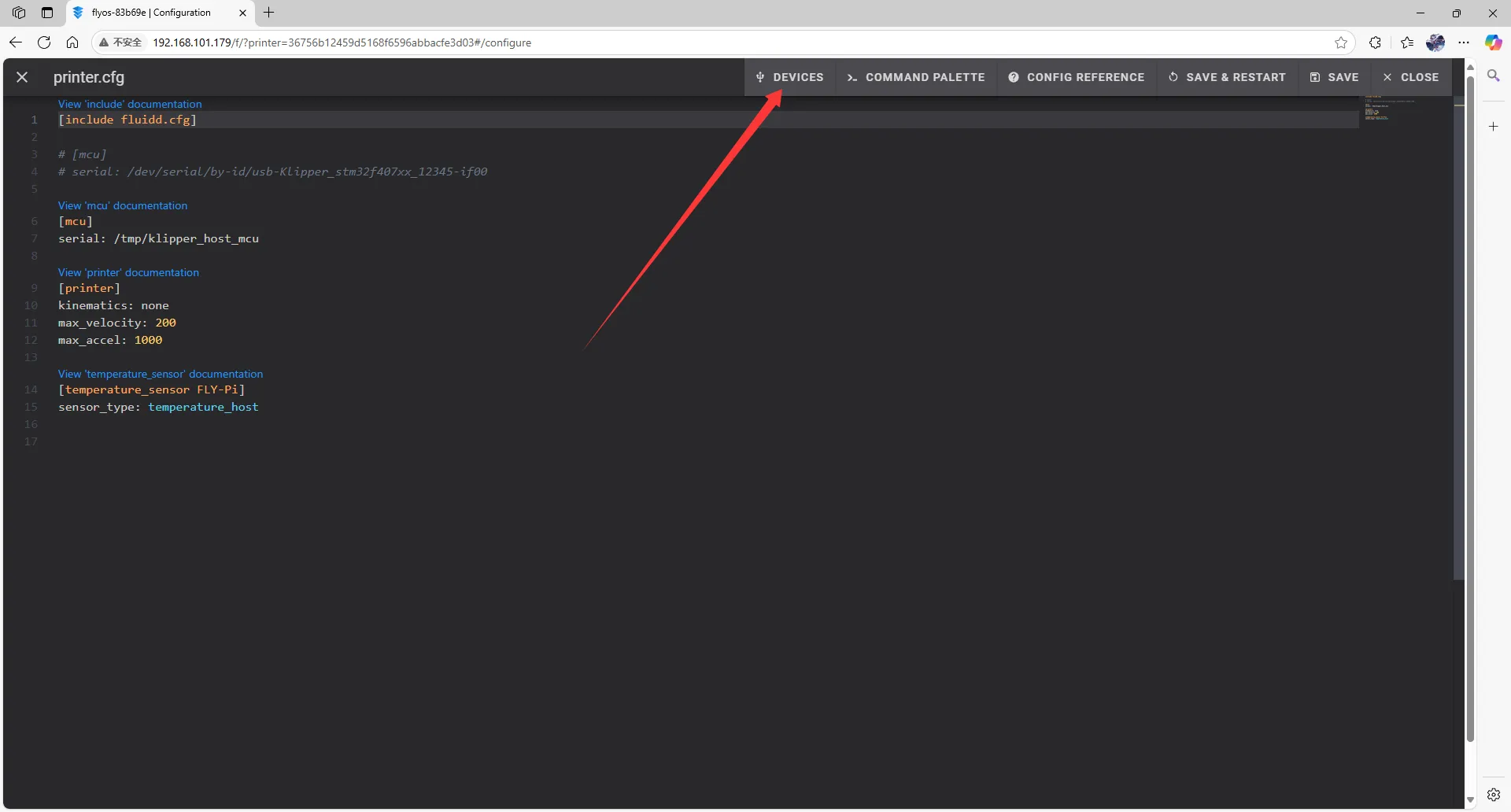
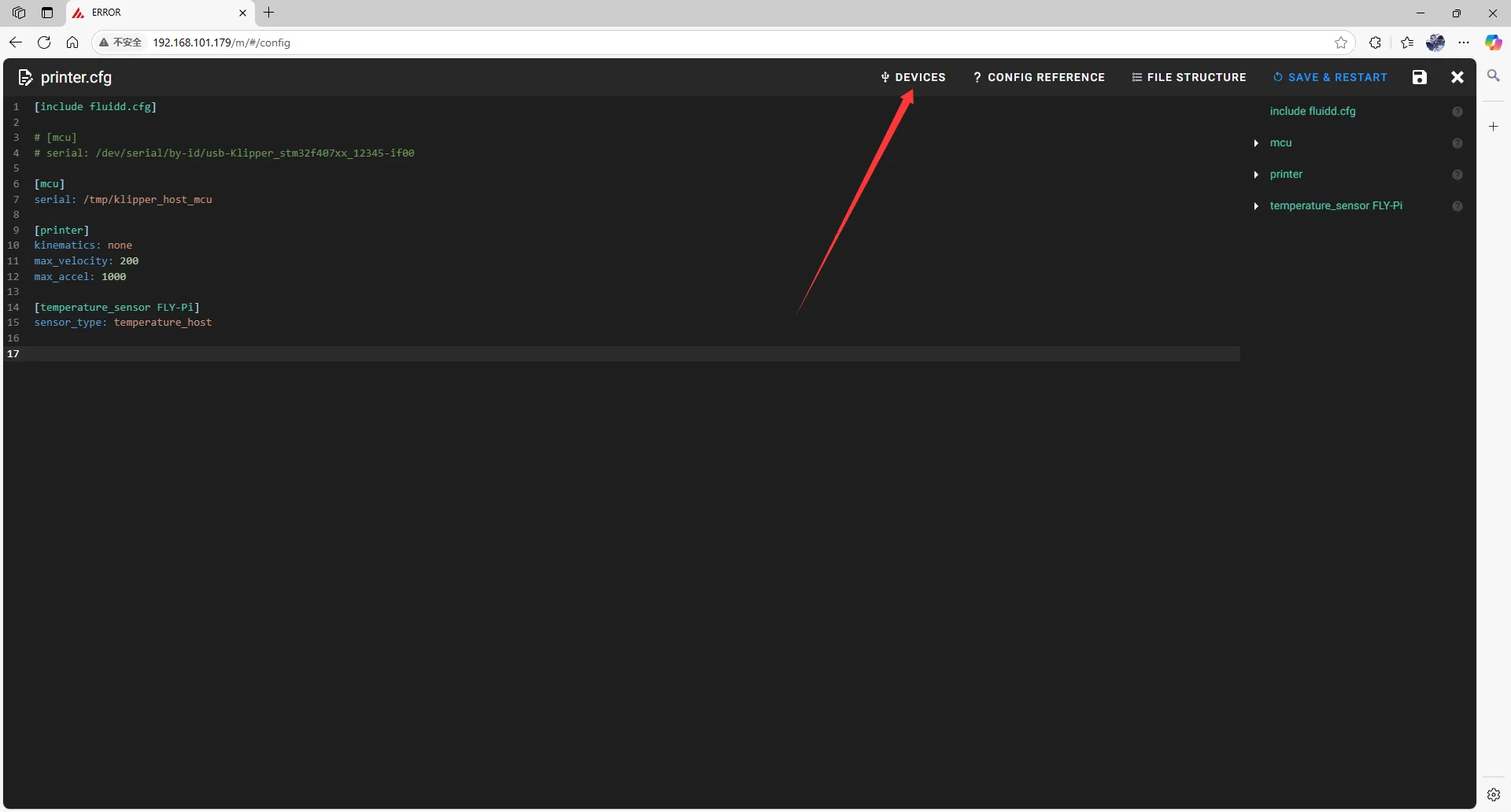
-
Click
SERIALand then refresh:- Refresh for fluidd
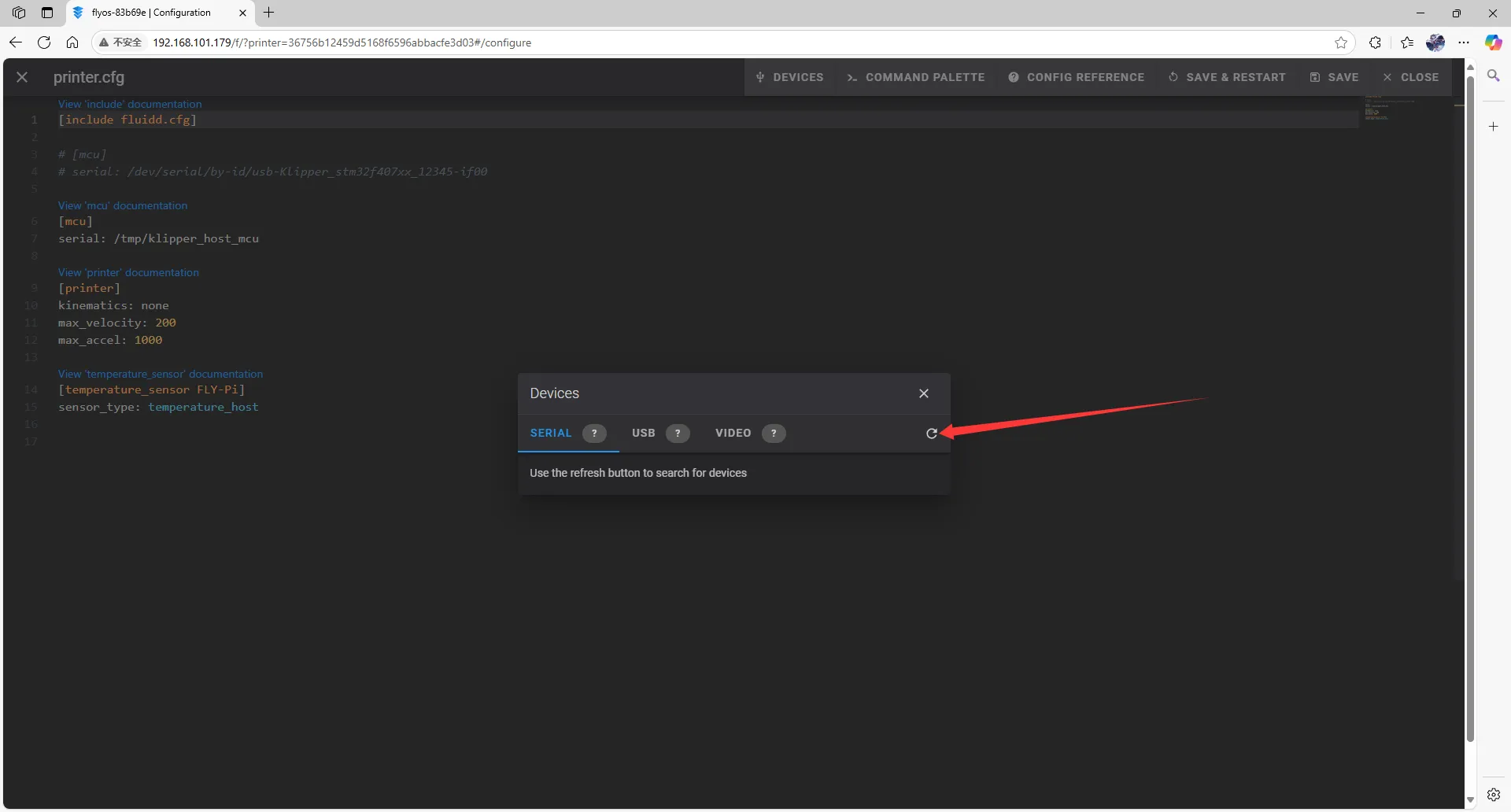
- Refresh for mainsail
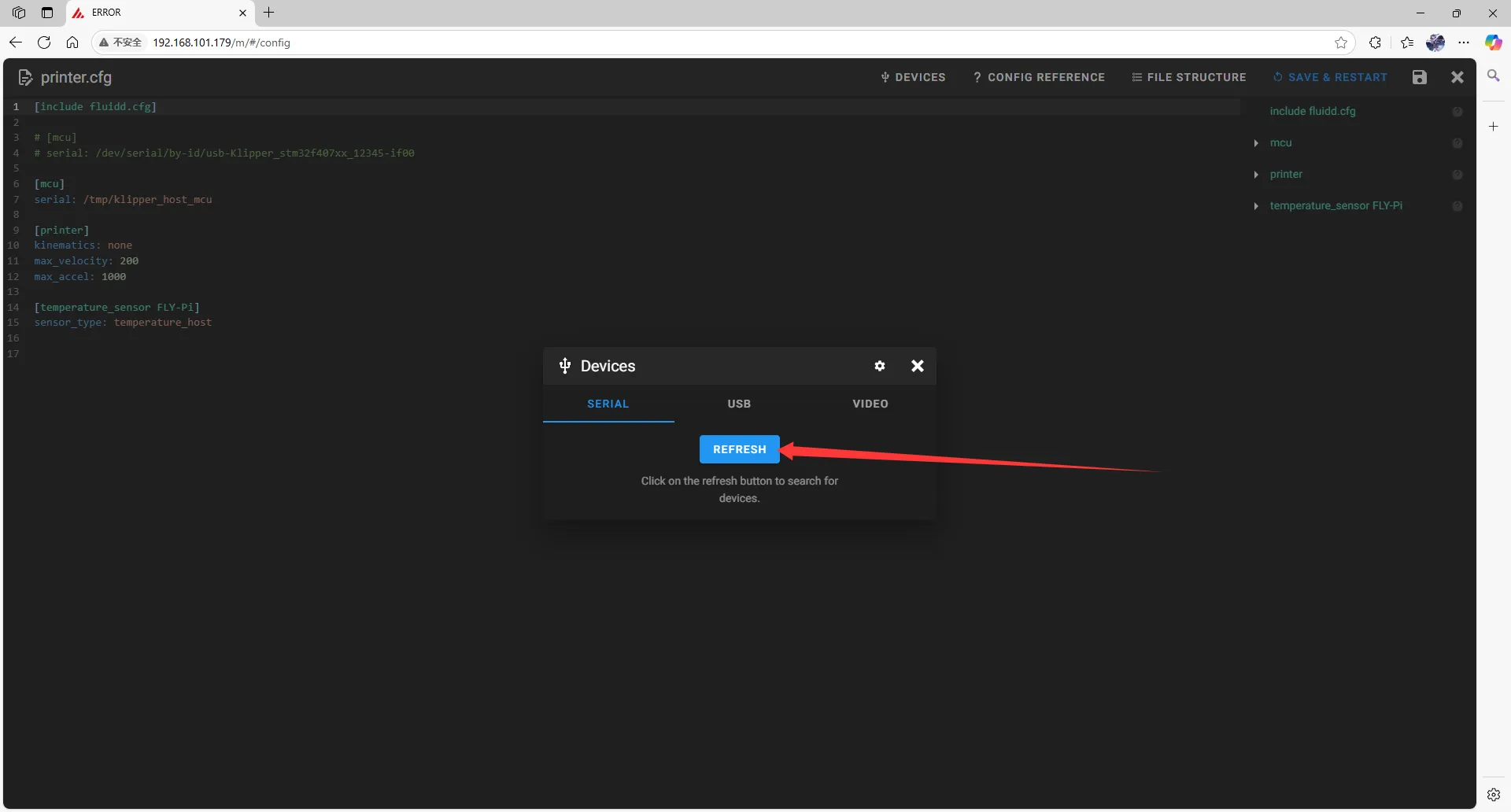
-
Copy the ID; click the arrow to copy:
- Check if
ttyAMCexists in fluidd, and ensure that Path by ID exists; this is the USB ID
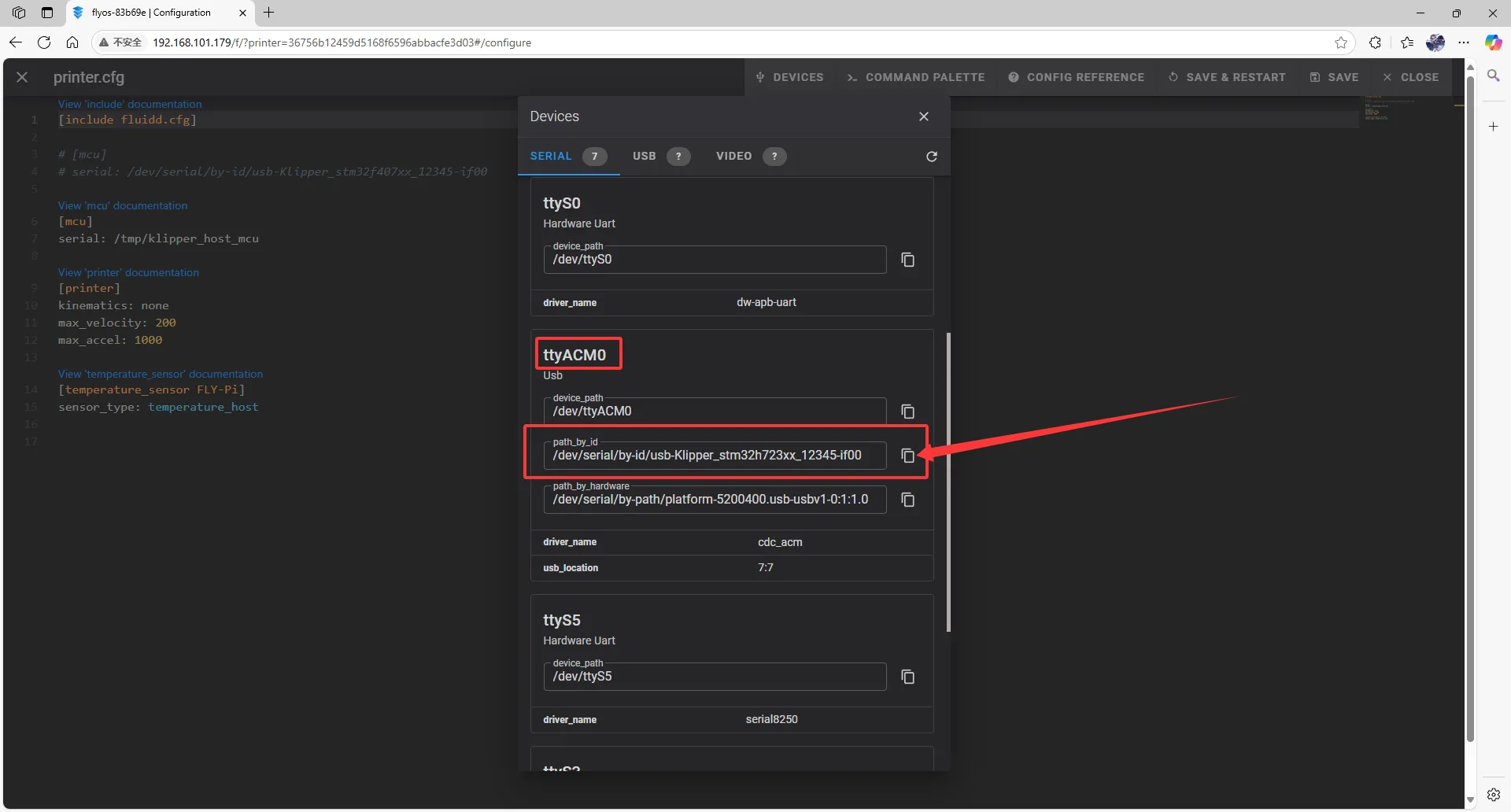
- Check if
ttyAMCexists in mainsail, and ensure that Path by ID exists; this is the USB ID
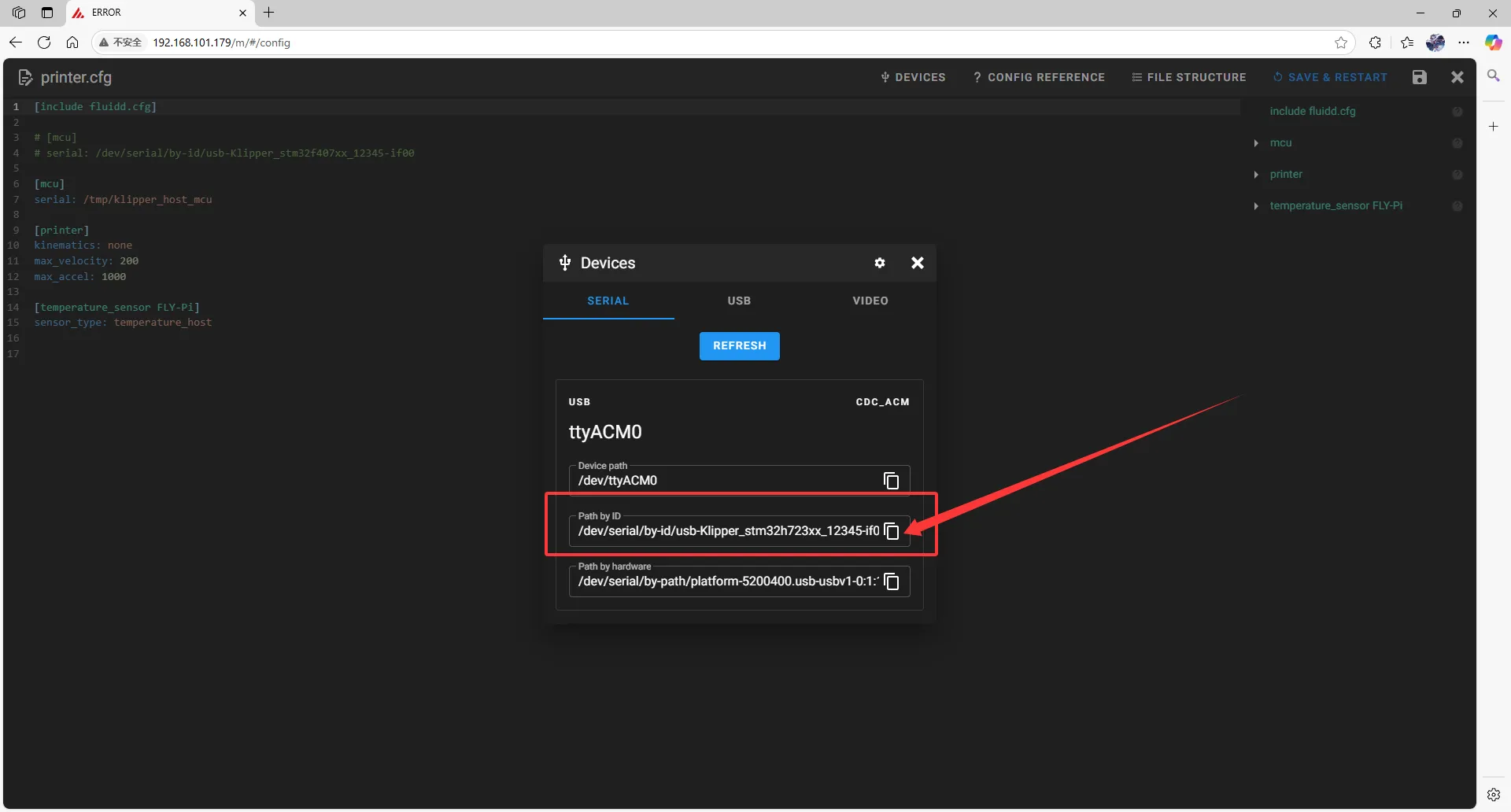
- Check if
Fill in the USB ID
-
Close
DEVICESand fill in the IDNote- Please change the following in the configuration file:
[mcu]
serial: /tmp/klipper_host_mcuto
[mcu host]
serial: /tmp/klipper_host_mcu- Add:
[mcu]
serial: <Replace this with the ID you just found>- In fluidd, locate [MCU]
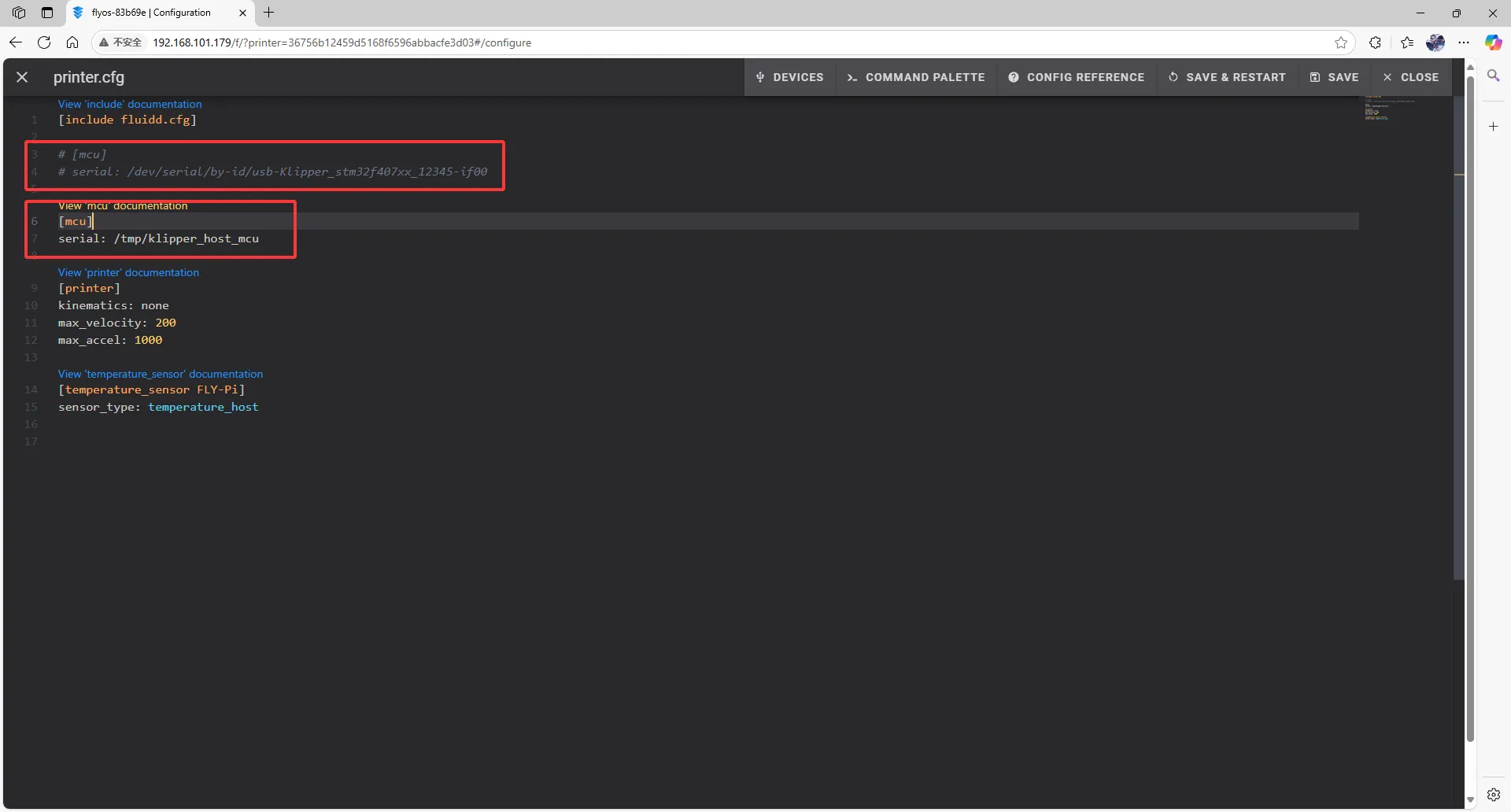
- In mainsail, locate [MCU]
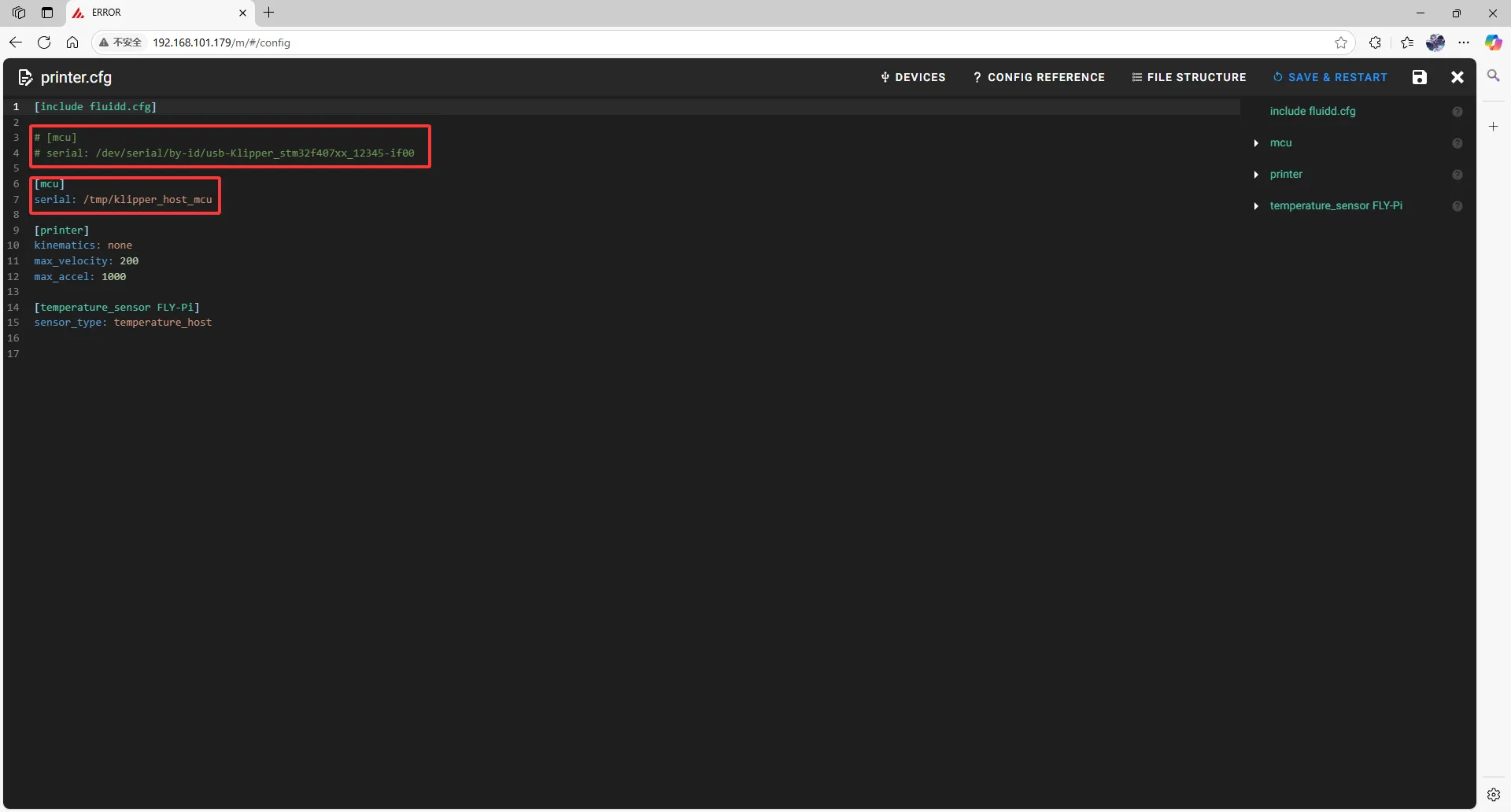
-
Fill the ID into the configuration.
tip- After entering the ID, click
SAVE & RESTARTin the top right corner.
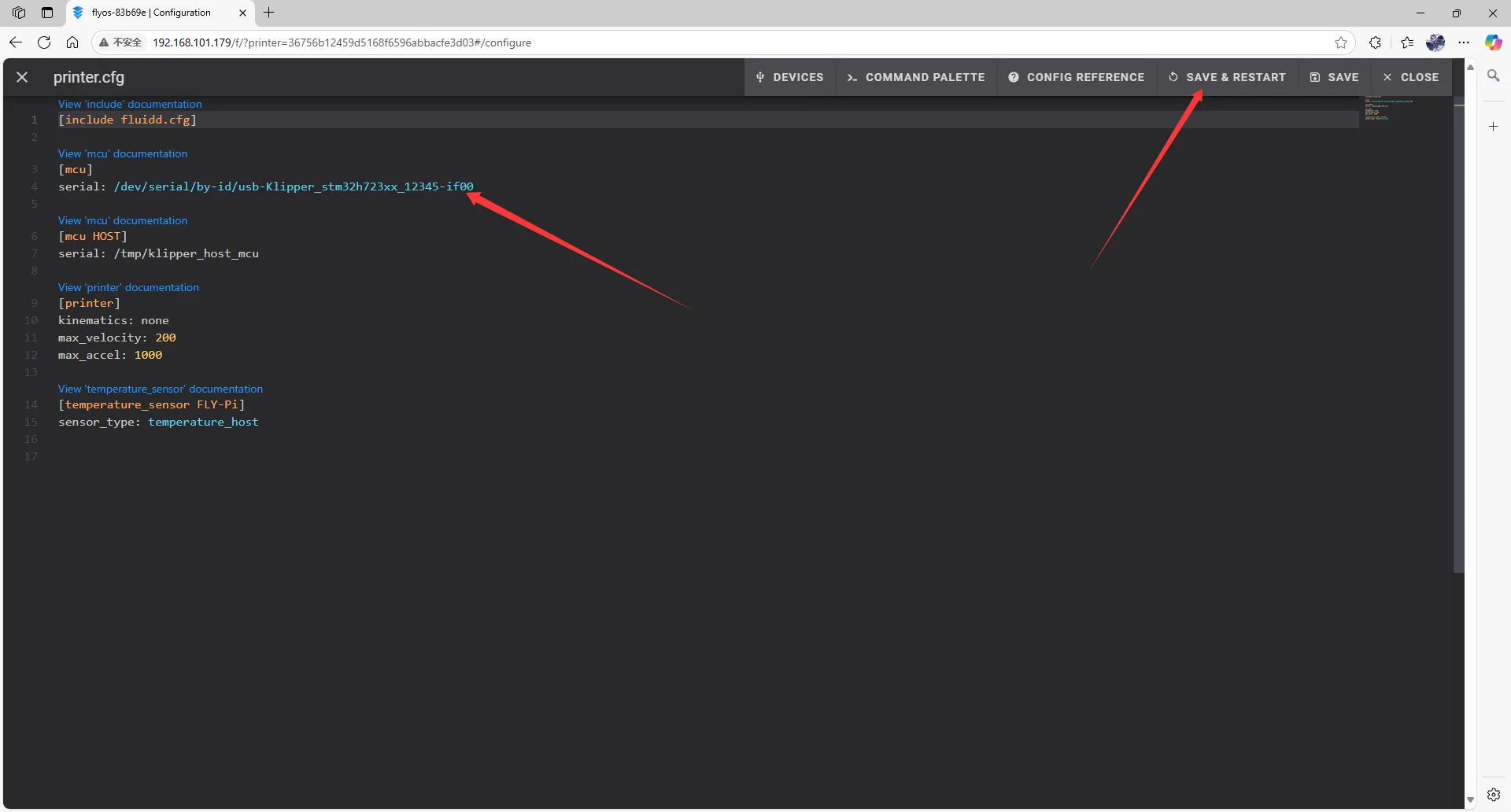
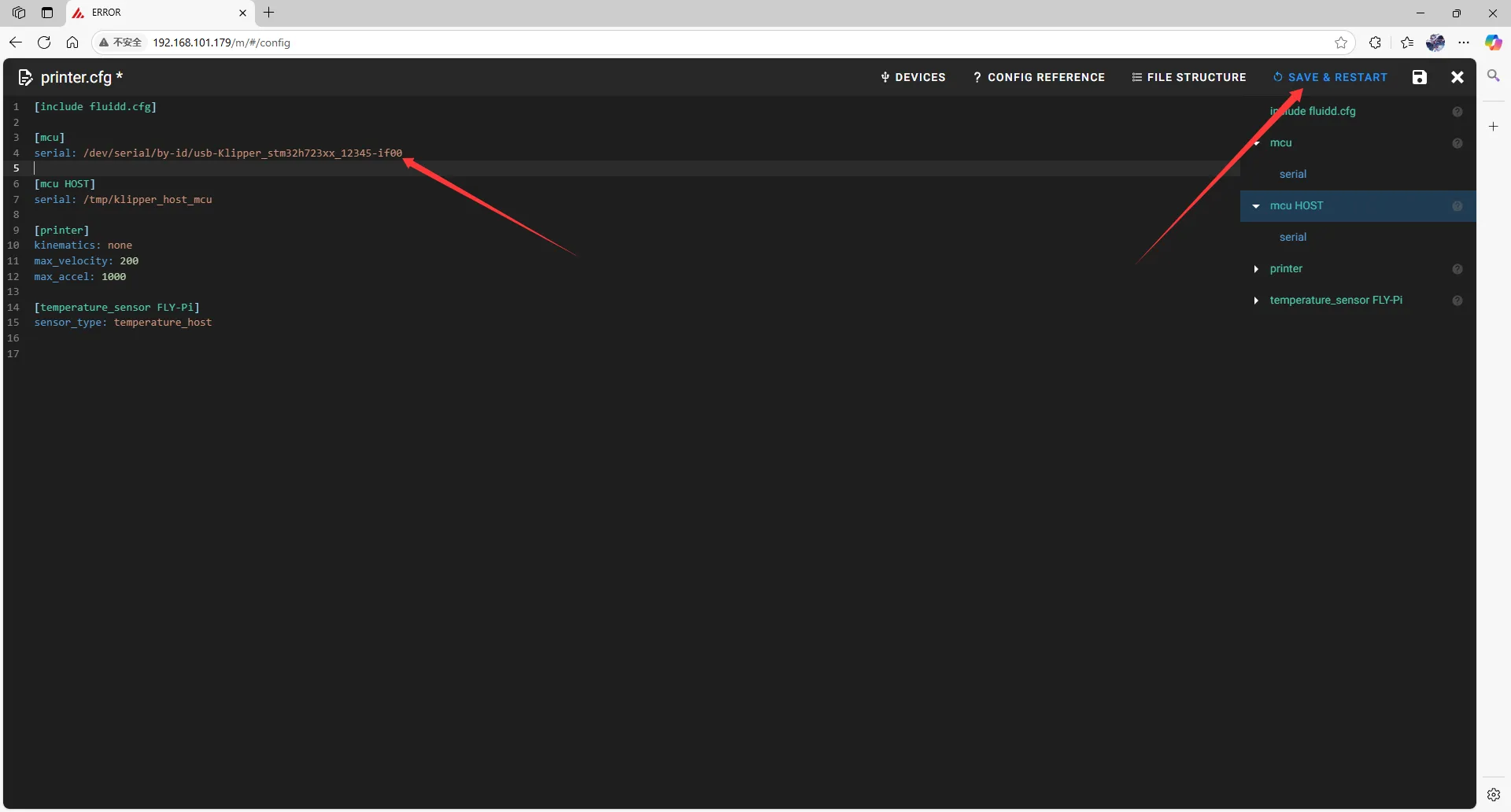
- After entering the ID, click
-
If Klipper displays a warning
ADC out of range, this is normal. Connect the heated bed and thermistor to the mainboard, configure the thermistor pins for the nozzle and heated bed, then save and restart.
Note: All IDs shown in this document are examples. Each mainboard has a unique ID; please use the actual ID you obtained.